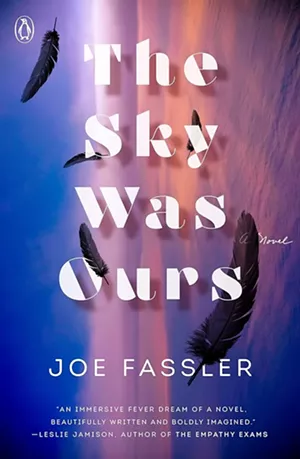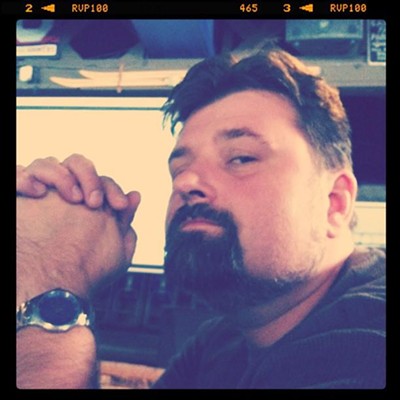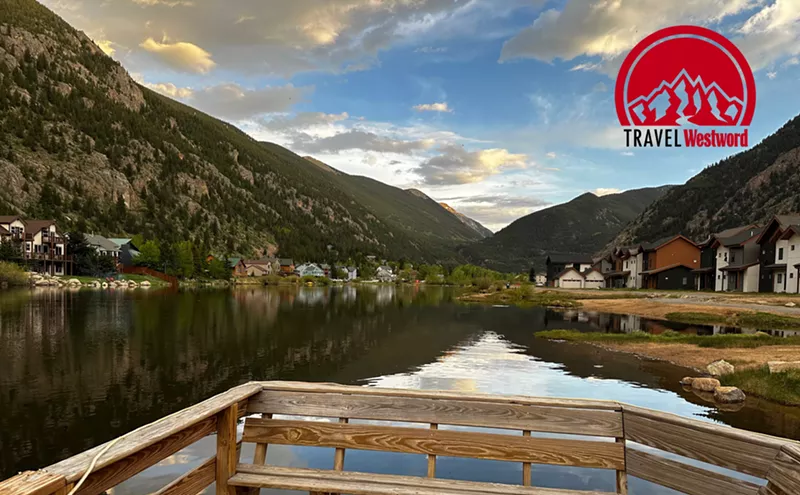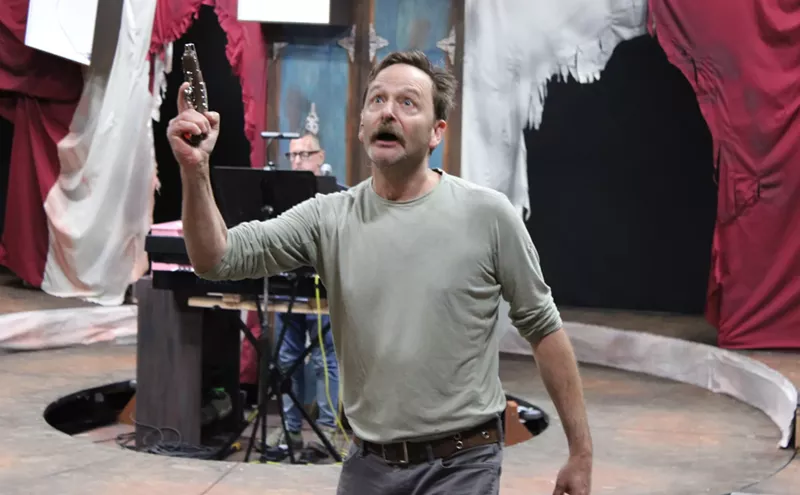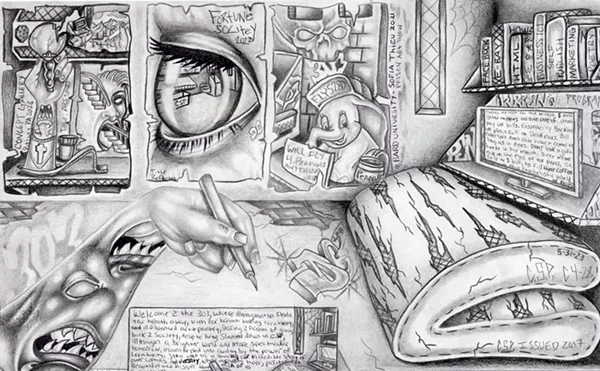Colorado author Joe Fassler once contributed to The Atlantic's "By Heart" series, starting back in 2013. In that role, he interviewed some of America's most cherished and famous authors — Stephen King, Amy Tan, Khaled Hosseini, Elizabeth Gilbert, Carmen Maria Machado and many others — about the literature that fundamentally affected their lives and bodies of work.
Now, with his new novel, The Sky Was Ours, someone might want to ask Fassler about his own inspirations. And you can do just that at Fassler's upcoming launch reading at Lighthouse Writers Workshop on Friday, April 26.
Fassler graduated from the famed Iowa Workshops in 2011 and, a year later, moved back to New York City. There he started writing — both the early stages of The Sky Was Ours and also in print journalism, not only in The Atlantic, but also for such outlets as Wired and the New York Times. "It was a way to make ends meet," admits Fassler, "just to support myself. But it became a passion, as well, and a career in its own right."
He and his wife moved to Colorado in 2019, partly for a change of pace. "New York City has so many great things going for it," Fassler says, "but it's not the place where you want to live if you want to live a low-overhead life that allows you to write long." Once here, Fassler was awarded a Ted Scripps Fellowship in Environmental Journalism from CU Boulder. "That got interrupted by COVID," Fassler says, "so it ended very unceremoniously in the midst of chaos. But it was great while it lasted."
But between the change of location and the forced downtime of the pandemic, Fassler was able to focus on the book he'd long been pursuing, and finally finish the project that had started way back in Iowa. "MFAs think in stories," Fassler laughs. "It took me a few years to figure out what I was working on was a novel. I didn't know how to write a novel; I thought I was writing a short story. But they're very different art forms."
Fassler, who says he just taught a novel-writing class for Lighthouse, insists that while writing a novel isn't generally taught in grad programs, it's certainly something that can be taught. "It's a matter of endurance," he says. "With short stories, you can always see the light at the end of the tunnel, and you can always sort of blast through it. There were stories I workshopped at Iowa that I'd just finished the night before on a high of coffee and adrenaline and commitment. The novel is more considered. It requires that."
The editing of a novel is a different animal, too, says Fassler: "You can obviously edit a story endlessly, but because of its limited scope, there's only so much you can do. With a novel, you can't just muscle through it."
Evidence for this from Fassler's new novel comes in his scuttled plan to originally set the book in a rural part of upstate New York, where his mother's family was from and where Fassler did his undergraduate work. "I'd spent a lot of time there," he recalls. "I knew the place, so it made sense that I'd set the book there, born and raised in this agricultural community. But even though I write about food and farming, it's so far from my life experience. I'm the child of college professors. Still, I tried to write from that perspective. I spent two years stuck there before I realized that I needed a point of access to this book from the vantage point of someone closer to me — you know, a neurotic person with artistic pretensions from New York City."
Self-deprecation aside, it was that change in the protagonist that made the novel come together. "I could feel it click," Fassler says. "I could focus on the story because the voice was set."
The story of The Sky Was Ours is observably mythic, based on the Greek myth of Icarus and his father, Daedalus, an innovator who creates wings of wax and feathers so that he and his son can escape captivity by simply flying away. But Icarus flies too high — an idiom born from this exact myth — and his wings melt, causing him to fall. Like many myths, it's a cautionary tale, but despite the fact that Fassler comes from academics as parents, he says it wasn't where the novel began.
"Like a lot of kids, I had the D'Aulaires' Book of Greek Myths, and I loved that with all its lavish illustrations. But I'd say the myth itself was something I more layered on top of the novel instead of anything I set out to write about," he explains. "There aren't a lot of literary archetypes around this model of winged-bird flight. You can read about the experience of flying in literature, but it's couched in certain ways, like in dream sequences, or in a way that's more magically realist. I was interested in something that straddled that line between the surreal and speculative, but also in the realm of plausible. I see Daedalus and Icarus in that same tradition."
He recalls the story of an eleventh-century monk who jumped off the roof of his English abbey trying to imitate flight; he crashed the winged contraption he'd made and was unable to walk for the rest of his life. But it was all because he believed the myth to be true. "Daedelus isn't a god, and there isn't magic involved; he's an inventor who creates something," Fassler says. "It's in the realm of the human."
So outside of classical myth and D'Aulaires, what are Fassler's literary influences?
"The book that has had the biggest impact on me is Moby-Dick," Fassler says, "which begins as a straightforward travelogue — a mysterious sailor named Ishmael recounting a desperate trip to sea. But when he finds his subject of fascination and horror — the monstrous whale — the whole thing blows apart, becoming an expansive meditation on the infinite, on the painful limits of human knowledge. That's a gesture I think about all the time, and certainly was on my mind as I wrote The Sky Was Ours. I love novels that seduce us with the promise of a rollicking tale and slowly draw us into something more subversive."
Joe Fassler reads from The Sky Was Ours, 6:30 p.m. Friday, April 26, Lighthouse Writers Workshop, 3844 York Street. The event is free for members and $5 for non-members.

Audio By Carbonatix
[
{
"name": "GPT - Billboard - Slot Inline - Content - Labeled - No Desktop",
"component": "23668565",
"insertPoint": "2",
"requiredCountToDisplay": "2"
},{
"name": "STN Player - Float - Mobile Only ",
"component": "23853568",
"insertPoint": "2",
"requiredCountToDisplay": "2"
},{
"name": "Editor Picks",
"component": "17242653",
"insertPoint": "4",
"requiredCountToDisplay": "1"
},{
"name": "Inline Links",
"component": "18838239",
"insertPoint": "8th",
"startingPoint": 8,
"requiredCountToDisplay": "7",
"maxInsertions": 25
},{
"name": "GPT - 2x Rectangles Desktop, Tower on Mobile - Labeled",
"component": "24956856",
"insertPoint": "8th",
"startingPoint": 8,
"requiredCountToDisplay": "7",
"maxInsertions": 25
},{
"name": "Inline Links",
"component": "18838239",
"insertPoint": "8th",
"startingPoint": 12,
"requiredCountToDisplay": "11",
"maxInsertions": 25
},{
"name": "GPT - Leaderboard to Tower - Slot Auto-select - Labeled",
"component": "17676724",
"insertPoint": "8th",
"startingPoint": 12,
"requiredCountToDisplay": "11",
"maxInsertions": 25
}
]


